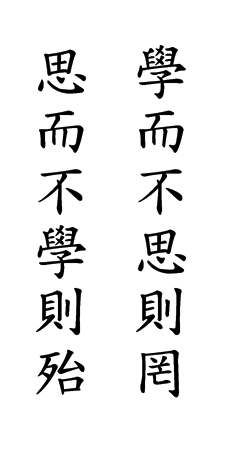Neo-ConfucianismTraditional Chinese values resurrectedBy Kenix Chow For centuries, Confucianism was the fountainhead of Chinese traditional values. This ended in the Cultural Revolution, roughly from 1966 to 1971. Since then some local scholars and political leaders have encouraged a revival of Neo-Confucianism. Confucianism was developed into Neo-Confucianism during the Sung and Ming dynasties (A.D. 960-1279 and A.D. 1368-1644). Sung and Ming philosophers Cheng Hao, Cheng I, Chu Hsi and Wang Yang-Ming not only inherited the Confucian classics but extended their teachings. This extension, known as Neo-Confucianism, aims at preserving the goodness of human nature and maintaining social and world order through communications and the development of humanity.
Hohk yih bat sih jak mohng, sih yih bat hohk jak toih — “Study without thought is nothing; thought without study is perilous.”Liu Shu Hsien, professor of philosophy at The Chinese University of Hong Kong, wrote a discussion paper titled “Reflections On World Peace Through Peace Among Religions — A Confucian Perspective”. He said, “Sung-Ming Neo-Confucianism primarily teaches how to develop what is within the self.” In accordance with Prof. Liu’s interpretation of Confucianism, it can be divided into three main streams. “The first is Spiritual Confucianism, the second is Politicized Confucianism and finally Vulgar Confucianism,” said Prof. Liu. “Spiritual Confucianism is the tradition of Confucius, Mencius, Cheng-Chu, Lu-Wang, which has been revived by contemporary Neo-Confucians as the ultimate commitment. “Politicized Confucianism refers to the tradition of Tung Chung-shu and Pan Ku. It served as the official ideology of the dynasties. It takes in ingredients from Taoism, Legalism and the Yin-Ying School,” Prof. Liu added. “Vulgar Confucianism implies popular beliefs that emphasize the values of family, diligence, education. . . , and can hardly be separated from other beliefs in popular Buddhism and Taoism,” added he. However, it is not easy to spread the notions of Spiritual Confucianism among common people since it is the highest level of Confucianism. Also, Politicized Confucianism is unsuitable to be given priority to its re-emergence because it promotes absolute power of the royals and authoritarianism. As a result, the remaining one is Vulgar Confucianism. “Vulgar Confucianism can make people recognise their own values and respect to their own lives. Thus, they won’t commit suicide so easily. “After self-recognition of human dignity, people will pay respect to their own parents and ancestors. In a social context, people can build up a mutual trust and respect first with neighbours and then with everybody,” Prof. Liu said. Confucianism not only can benefit a particular society or a particular nation, indeed it gives benefits to the whole world. Its traditional concept of “harmony within disagreement” can bring different states, races, cultures, and religions to engage into peaceful discussions and communications. Better understanding between countries can certainly contributes a lot to world peace. |
